Economic Impact of Small Business
Author: Brendan Carney
Small businesses are a key component and major contributor to the stability of local economies. They offer unique employment opportunities and create a foundation for large corporations. They attract creative employees who have the freedom to be innovative and solve problems for larger firms through outsourcing. They stimulate local economies by providing small scale investment that strengthens the entire community. Food trucks are one form of small business that provide members of the community with a memorable experience and allow the operator of the food tuck a rewarding job giving back to the community they serve.
In cities across the U.S. the local food scene is dominated by nationally recognized fast food chains. These ubiquitous restaurants locate themselves on every busy intersection and provide customers with a homogenous experience. An experience that can be standardized in every restaurant across America. This gives the customer a sense of reliability knowing they will get the same product in multiple locations. However, there is no individuality to the dining experience. The customer has no connection to the cook, nor the community it is dining in. Food trucks are the solution to the problem.
Food trucks provide customers with a unique experience at an affordable cost. The menu is limited only by the chefs’ imagination and feedback is immediate due to the chefs’ relationships built with customers. This connection with the community starts with the various local markets that the food truck is supplied from. Food trucks are mobile and have the ability to change locations during the day. This allows them to locate themselves where the demand is highest. For instance, they can go to business parks for the lunch hour, and go to popular nightlife locations for the dinner and late night crowd. This versatility allows the operator of the food truck to reach out to more members of the community in a shorter period of time.
Not only are food trucks affordable for the customer, they are affordable for the operator. A typical family owned restaurant has high startup costs that range from two hundred eighty thousand to five hundred thousand dollars and take up to a year to open. Roughly twenty-five percent of these restaurants will close their doors within the first year, and sixty percent after three years. Food trucks cost roughly fifty thousand to one hundred fifty thousand dollars to start up and can open in as little as two months. Other costs associated with startups can be minimized with food trucks because they are not required to pay property taxes and require fewer operating licenses. Marketing expenses can be minimized with the use of social media. Overall, food truck operations are cheap and efficient.
Food trucks enrich the local community by allowing chefs to make dishes that represent the various people that reside in the area. They mimic fast food restaurants with convenience and affordability, but differentiate themselves with colorful trucks, interesting locations, and fluctuating menus. These highly versatile trucks give power to the operator by allowing them to move freely around the community in order to reach out to the most customers. They provide a heterogeneous experience that cannot be replicated by fast food chains. Food trucks are the small businesses that East Lansing needs to continue to stimulate the local economy, strengthen the community, and incorporate the city of East Lansing with Michigan State’s campus.
An example of this principle at work: Food Truck Economics
Back